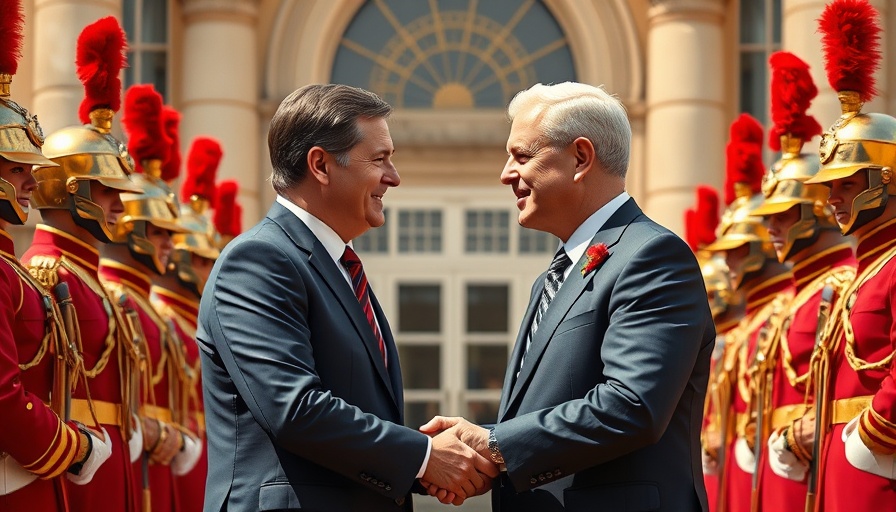
The Shifting Landscape of Franco-Senegalese Relations
The recent clandestine meetings between Nicolas Lerner, the head of France's intelligence agency, and Senegalese President Bassirou Diomaye Faye, highlight a critical juncture in Franco-African relations. Following France's military withdrawal from Senegal, these discussions aim to address the escalating threat posed by jihadist groups in the Sahel region. Lerner's visits signify Paris’s deep concern about the ripple effects of instability and its impact on coastal nations, including Senegal.
Understanding the Military Exit: A Strategic Move
France’s decision to pull out its troops from Senegal represents not just a change in military strategy, but also a pivotal moment in the post-colonial relationship between France and its former African territories. This withdrawal follows decades of military presence aimed at stabilizing the region amidst rising Islamist threats. The recent elections in Senegal have sparked discussions of governance and democratic ideals, as the nation seeks to forge its identity independent of its colonial past.
The Jihadist Threat: A Catalyst for Cooperation
The Sahel has witnessed a surge in violent extremism, with both local and international terrorist groups exploiting socio-political instability. The backdrop of this threat is a burgeoning narrative of governance failures and a need for enhanced intelligence-sharing between Senegal and France. Lerner's strategic discussions with Faye can be seen as a response not only to immediate security concerns but also to a legacy of French involvement in regional affairs.
Future Implications for West African Security
As countries like Senegal navigate their sovereignty and security, the implications of these backdoor meetings extend far beyond bilateral relations. With growing unrest in neighboring Mali and Burkina Faso, the French withdrawal raises questions about the ability of local forces to maintain peace without external support. Moreover, the desire for a pan-African identity amidst threats of terrorism may reshape military and diplomatic strategies across the continent.
France's Evolving Engagement in West Africa
As the geopolitical landscape in West Africa continues to change, France's strategy must adapt to new realities. The need for a comprehensive approach, integrating political, economic, and security dimensions, is essential for sustainable peace. The discussions surrounding regional cooperation highlight the importance of collective action in addressing terrorism and promoting democratic values. Engaging with regional bodies like ECOWAS will be key to fostering stability, cooperation, and economic development.
The Role of Education, Governance, and Development
The future of West African countries hinges on more than military strategies; the emphasis on education, governance, and holistic development is paramount. By investing in human capital, addressing systemic corruption, and fostering democratic practices, Senegal can build resilience against extremist ideologies. Educational initiatives not only empower the youth but also cultivate a culture of peace and understanding that counters the narratives exploited by extremist groups.
The Economic Dimension: Trade and Growth in West Africa
Furthermore, the economic underpinnings of peace are vital. Initiatives such as the African Continental Free Trade Area (AfCFTA) can play a crucial role in enhancing trade, reducing poverty, and promoting prosperity. Countries like Senegal stand to benefit significantly from regional integration efforts that focus on mutual growth, infrastructure development, and sustainable resource management.
A Call for Pan-African Solidarity
As regions grapple with challenges of governance, climate change, and social equity, the necessity for pan-African solidarity becomes even clearer. Collaborative efforts across the continent can lead to powerful movements toward decolonization, economic empowerment, and cultural restoration. Senegal's commitment to these ideals will not only reflect in its domestic policy but will also inspire neighboring nations to pursue inclusive growth and regional cooperation.
Engagement and dialogue at all levels remain critical. The dynamic nature of these discussions between Senegal and France signifies not just a historical pivot but a pathway to reshape African responses to contemporary challenges, fostering resilience in governance and human rights. Thus, Southeast African governments, including Senegal, must seize the moment to articulate a clear vision for a future rooted in democracy and economic stability.
 Add Row
Add Row  Add
Add 




Write A Comment